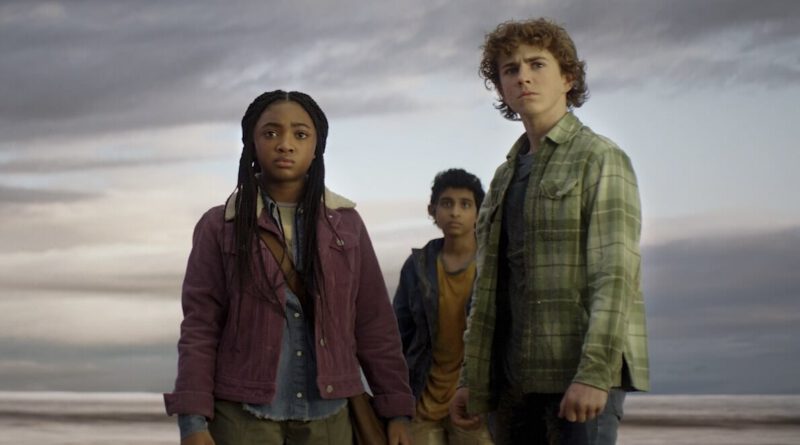How is ‘Percy Jackson and the Olympians’ different from the books?
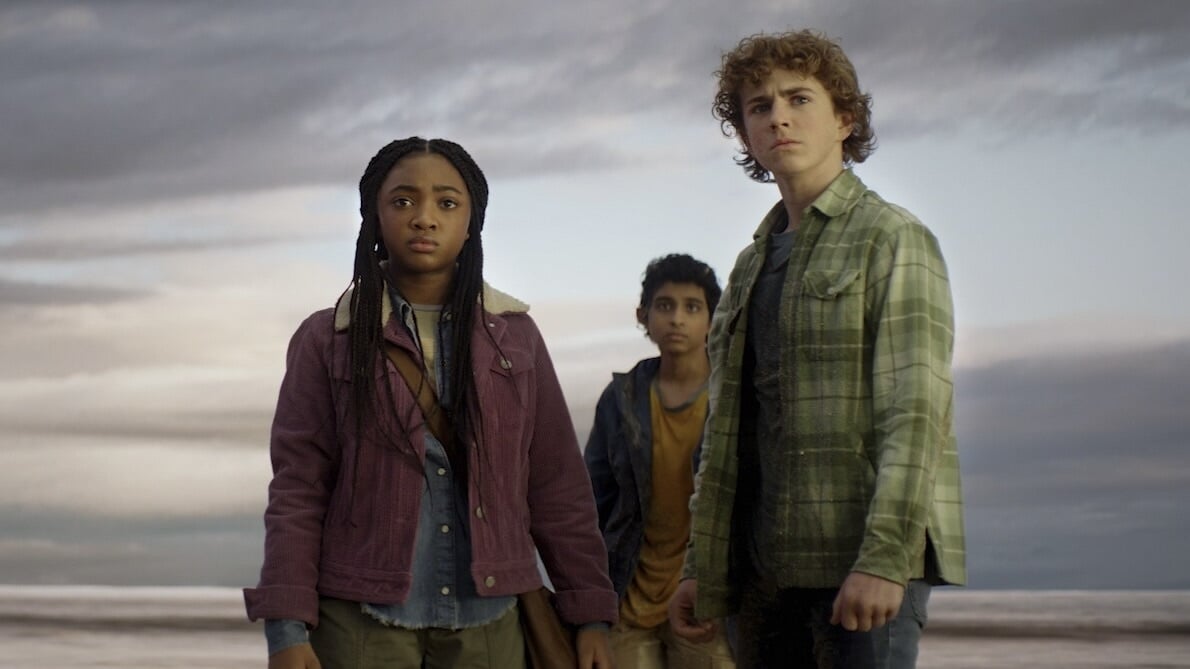
Percy Jackson and the Olympians fans, the wait is over. A worthy adaptation of Rick Riordan’s beloved novels is finally hitting TV, and I, for one, could not be giddier to relive my childhood.
As is the case with all book-to-screen adaptations, Percy Jackson and the Olympians deviates occasionally from the source material. However, the main arc of the series remains the same: 12-year-old Percy Jackson (Walker Scobell) learns that he’s a demigod, the son of a human woman and a Greek god. Not long after this discovery, he undertakes a cross-country quest to recover Zeus’ stolen Master Bolt and stop a war of mythic proportions. Accompanying him are Annabeth Chase (Leah Sava Jeffries), a daughter of Athena, and Grover Underwood (Aryan Simhadri), Percy’s satyr protector.
This story will sound familiar to book fans, but the show does make a few changes along the way, adding new story beats, omitting others, and focusing on other characters beyond Percy’s narrative point of view. So what are some of the biggest changes the show makes? Do they work? And if so, what do they add to the show? Let’s dive in. (But take heed: From here on out, spoilers for the show and the novels are in full effect.)
Episode one: The Mrs. Dodds fight (and aftermath) look a little different.
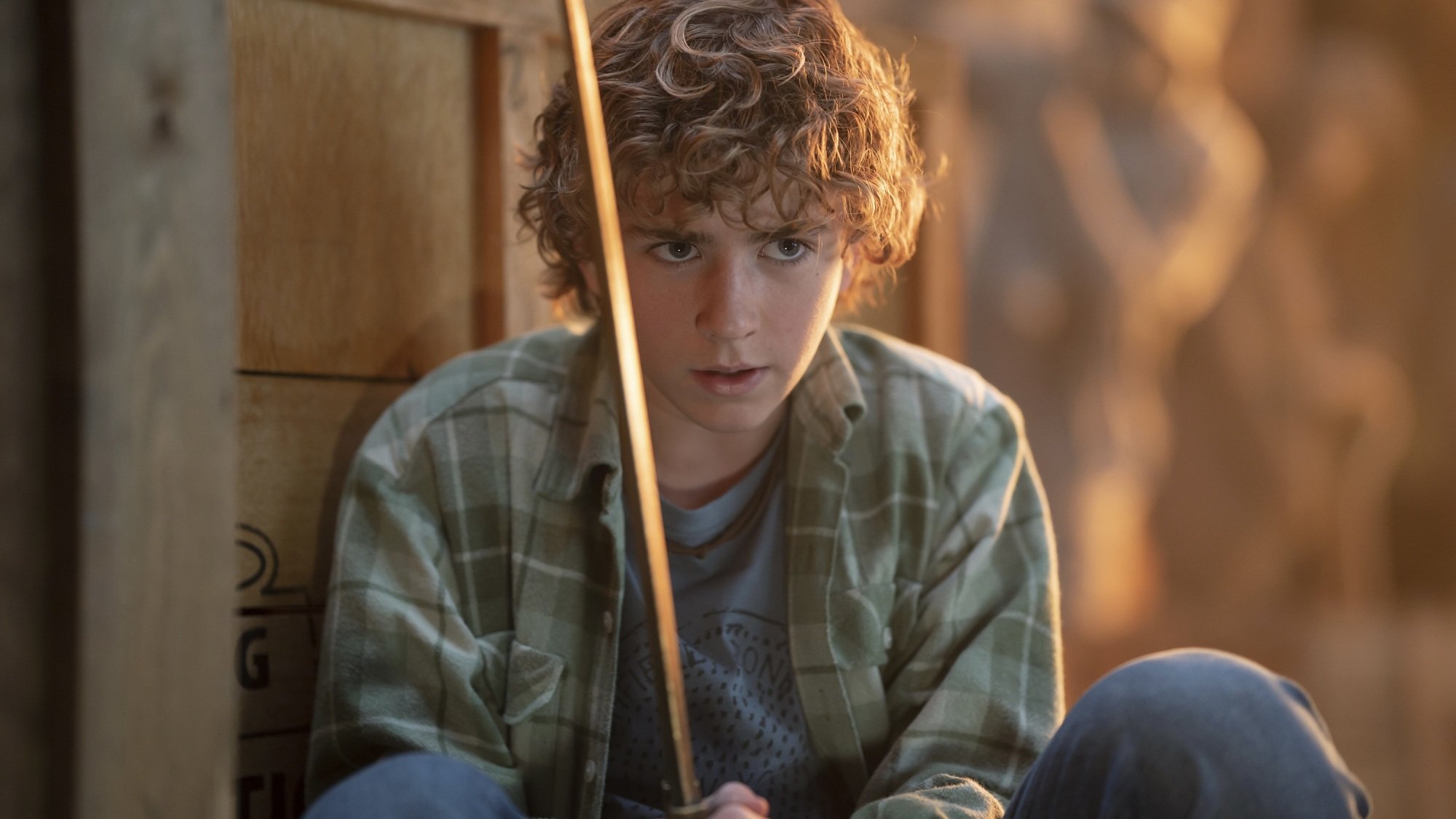
Season 1 of Percy Jackson and the Olympians tackles Riordan’s The Lightning Thief, meaning it kicks off, like the book, with Percy’s fateful field trip to the Met. In the novel, math teacher Mrs. Dodds (Megan Mullally) lures Percy into the museum alone. She reveals herself to be a Fury and attempts to kill him. Luckily, Latin teacher Mr. Brunner (Glynn Turman) — later revealed to be the centaur Chiron — tosses Percy a ballpoint pen-turned-sword, and he’s able to slay Mrs. Dodds.
The show takes a different approach, moving the fight to the front steps of the Met and removing Mr. Brunner’s involvement. Instead, Mrs. Dodds lands on top of Percy and nearly finishes him off. It’s only by a stroke of luck that Percy survives, as his pen (given to him earlier) turns into his sword Riptide and impales Mrs. Dodds without Percy realizing it.
On the one hand, this change threw me for a loop, as the scene plays out extremely quickly and robs Percy of his first big monster slaying moment. If anything, Dodds’ death here reads more like an accident! However, the fast-paced, confused framing of the incident places us deeper in Percy’s horrified mindset. His math teacher is trying to kill him — of course he’d be freaking out and not be completely aware of what’s going on. His less coordinated attack here also contrasts nicely with his slaying of the Minotaur at the end of episode one. Armed with more knowledge about who he is, Percy is able to take down another fierce beast with more control this time. It’s his first classic hero moment, something the show has built to from his initial flailing defense against Mrs. Dodds.
The fallout from Mrs. Dodds’ attack plays out a little differently in the show as well. Percy is expelled from Yancy Academy because he supposedly pushed bully Nancy Bobofit (Olivea Morton) into the Met fountain — a story Grover corroborates even though he’s supposedly Percy’s best friend! While this may seem like a betrayal at first, it was actually Grover playing the part of protector to a tee. Knowing that monsters will find Percy at Yancy, Grover realizes he has to get him away from the school as quickly as possible. We get hints of this motivation in the book, especially when Percy eavesdrops on a cryptic conversation between Mr. Brunner and Grover. Yet Grover’s choice in the show is a concrete example of him doing everything he can to keep Percy alive — even if it means he may lose his friendship. The seeming betrayal also isolates Percy further, bringing him to an even lower emotional point by the time he learns the truth about who he is.
Episode one: Sally Jackson has a bigger part to play.
Speaking of the truth about who Percy is, let’s get into how he finds out the truth in the show versus the books. The Lightning Thief sees Percy getting a crash course in very real world of Greek myth from his mother, Sally (Virginia Kull), and Grover on the ride to Camp Half-Blood. At camp, Chiron, Annabeth, and Luke (Charlie Bushnell) teach him even more, including telling him outright that he’s a half-blood.
However, in the show, a lot of these revelations fall to Sally. She’s the one who tells Percy he’s a demigod, hoping to console him about why he’s always felt different from everyone else. We also see how she’s been training Percy for his birthright his whole life. One sweet flashback scene features her telling Percy why she named him after Perseus. It’s not just because Perseus was a hero, but because of the bond he and his mother shared while cast adrift at sea. Later, we also understand just how far Sally will go to get Percy to safety. When the Minotaur attacks, Sally takes a more active role in keeping it away from her son, including distracting it with Percy’s red jacket, matador-style.
None of this is to say that Sally doesn’t get a lot to do in the books: Right from the start, we see that she’s a fiercely devoted, loving mother. She listens to Percy’s worries about being expelled from Yancy and even gives him tips on how to survive the Minotaur attack. We just get less time with her is all. In Percy Jackson and the Olympians’ first episode (which was co-written by Riordan), that time is expanded upon somewhat. By giving Sally more of a say in telling Percy about who he is, the show also helps build their emotional connection, which in turn informs Percy’s decision to go on his quest in the first place.
Episode two: The hellhound goes missing.
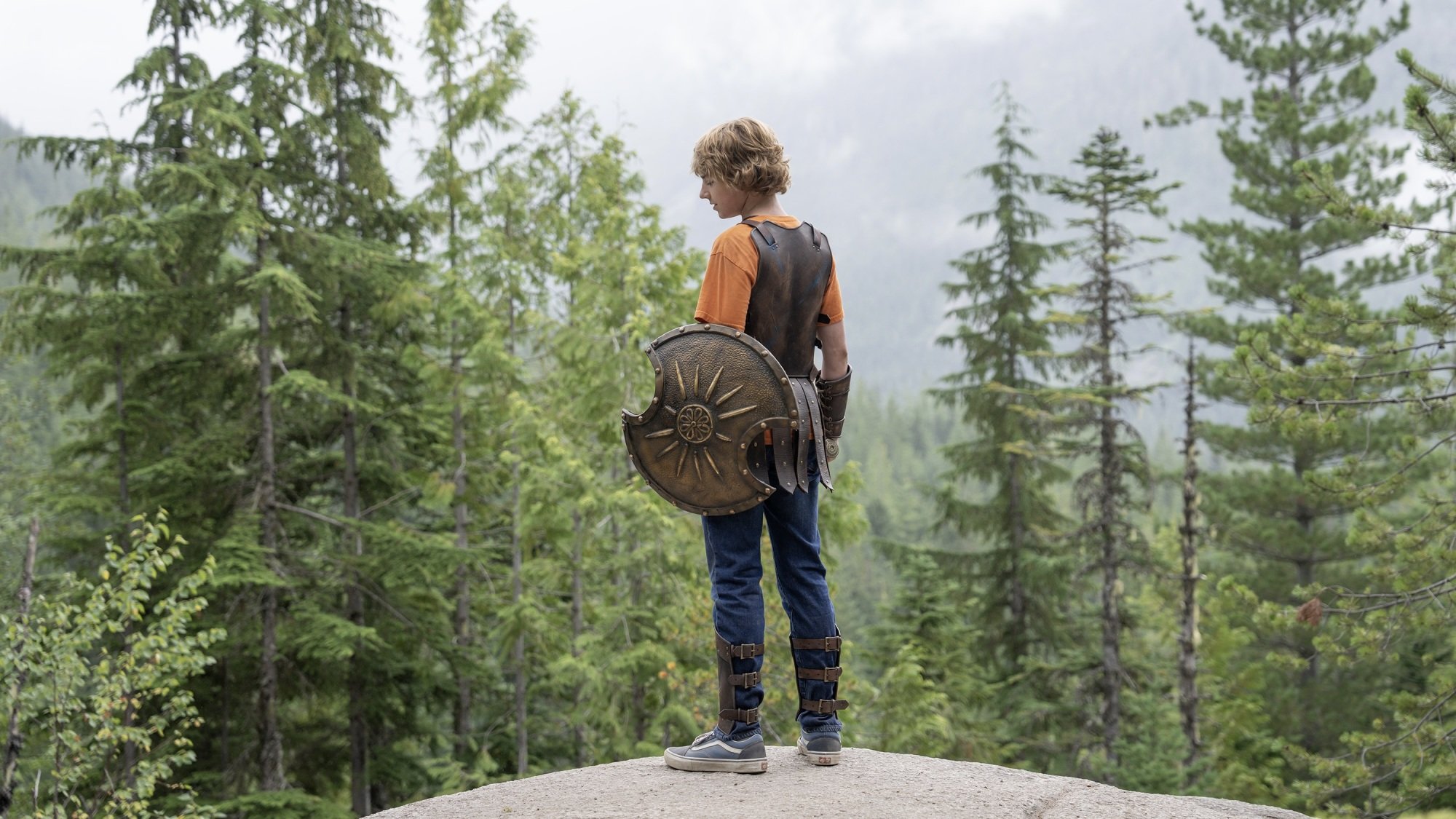
The main set piece of Percy Jackson and the Olympians‘ second episode is a camp-wide game of Capture the Flag. The game plays out the same way it does in the books, with Annabeth using Percy as bait to distract the rival team captain — and daughter of Ares — Clarisse La Rue (Dior Goodjohn). Her plan results in victory, and here’s where the show and the book diverge. In the book, the Capture the Flag win is quickly overshadowed by the appearance of a bloodthirsty hellhound, whose attempt to kill Percy is thankfully unsuccessful.
The hellhound scene is all of a page and a half long, so perhaps that’s why it simply doesn’t appear in the show. After all, Percy Jackson and the Olympians calls for the creation of several complicated on-screen beasts. If you’re going to cut one to save the brunt of visual effects for other creatures, this would be the one to choose. Still, the hellhound’s arrival marks an important change for the atmosphere at Camp Half-Blood. A hellhound on camp grounds is a signal that something is very wrong. Only a traitor in the campers’ midst could have summoned the beast, stoking an atmosphere of paranoia that culminates in Percy accepting the quest to recover Zeus’ Master Bolt. Without the hellhound, we unfortunately get less of a sense of that paranoia, or much of a hint at a certain traitor.
The absence of the hellhound also changes the sequence where Poseidon claims Percy as his son. After suffering severe wounds from the attack, Percy goes into a nearby creek on Annabeth’s orders. Just like with his Capture the Flag injuries, his hellhound wounds heal magically thanks to the water. Poseidon chooses this moment to reveal himself as Percy’s father.
With the hellhound missing from the show, we only see the water’s healing properties working post-Capture the Flag. But between that instance and Percy’s magical control over water in his bathroom fight with Clarisse, Annabeth has gathered enough evidence to realize who Percy’s father is. Wise girl, that one! To prove her point, she shoves him back into the water, and we get the show’s rendition of the Poseidon-claiming scene. Honestly, I adore the shove — it’s so deeply in keeping with the mildly contentious start to Percy and Annabeth’s dynamic, as well as a reminder of just how young these kids are.
The only part of this scene that disappoints me is the Poseidon reveal. After the triton appears over Percy’s head, we get a disembodied Chiron voiceover telling us what that means. However, we don’t get to see his or the campers’ reactions in the moment. And given that Percy is a forbidden child of one of the Big Three gods — Zeus, Poseidon, and Hades — their reactions should be massive! For example, the book sees campers kneeling (some, like the children of Ares, do it reluctantly). I wish the show could have included something like that in order to let us sit in this moment more and understand the momentous consequences of Percy’s parentage.
Episode two: Grover learns about Sally Jackson’s fate from the Council of Cloven Elders.
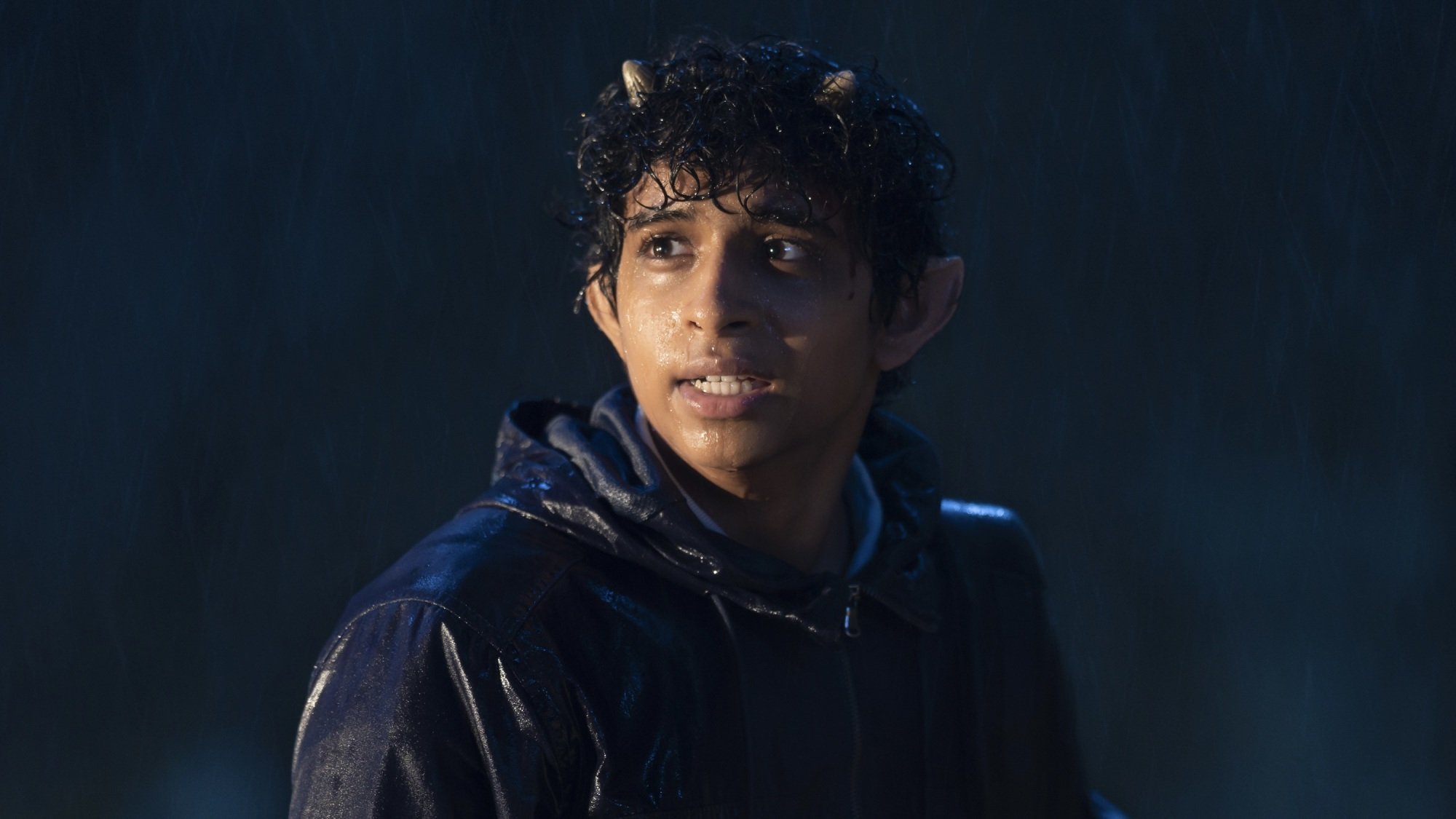
A totally new subplot in episode 2 involves Grover speaking to the Council of Cloven Hooves, a group made up of satyrs. He learns from them that Sally is not actually dead, a fact neither Chiron nor camp director Dionysus (Jason Mantzoukas) want Grover to tell Percy. However, Grover does so anyway, as Percy is his friend and deserves to know the truth about his mother. Knowing that Sally is alive and could be brought back from the Underworld motivates Percy to take the quest to get the Master Bolt back from Hades, lending an extra layer of drive to his epic journey.
In the book, Percy doesn’t know his mom isn’t fully dead. In fact, we don’t learn that ourselves until (spoiler alert!) our valiant crew reaches the Underworld. There, Hades reveals he took Sally hostage right before she died in order to gain some leverage over Percy. You can bet we’ll get that confrontation in the show farther down the line, but for now, we know that Percy didn’t just accept his quest in order to gain glory or save the world. He accepted it to save Sally, whose relationship with Percy is the emotional core to Percy Jackson and the Olympians‘ two-episode premiere, even when she’s not on-screen.
This story will be updated weekly as each new episode drops.
Percy Jackson and the Olympians is now streaming on Disney+, with new episodes weekly.
